The X Button
Wizardry 101
by Todd Ciolek,

Operation Rainfall seemed like a good idea. Instead of complaining on message boards, fans mobilized a letter-writing, game-reserving campaign aimed at Nintendo. Their goal: Nintendo releasing Xenoblade Chronicles, The Last Story, and Pandora's Tower on the North American Wii, just as the company did on the Japanese Wii. Their efforts put Xenoblade preorders atop Amazon's best-seller list, and Nintendo promised an announcement about the games. A few days later, Nintendo delivered that announcement: “SUCKERS.”
Well, not quite. Nintendo's announcement was “We never say 'never,' but we can confirm that there are no plans to bring these three games to the Americas at this time.” And that strikes me as a rather diplomatic “no.”
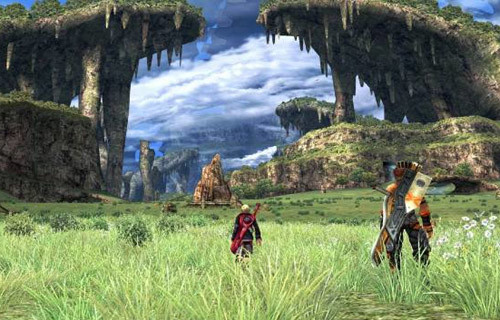
Nintendo isn't entirely in the wrong, of course. The company's always been shrewd about what it brings out of Japan, and the Wii is clearly settling into its final stretch. I imagine there are studies, focus groups, and tests aplenty that tell Nintendo not to take a chance on selling two RPGs and a lesser-known action game to North America.
The problem is that if Nintendo won't release these games in North America, no one else can. Other major publishers are willing to let others snap up titles they may skip—Sony allowed Atlus to release Demon's Souls, and Namco Bandai gave Fragile Dreams and The Sky Crawlers (both Wii offerings, no less) to XSEED Games. Nintendo, by contrast, keeps a painfully tight reign on any game they publish in any region. The results of Operation Rainfall bring back memories of the ill-fated struggle for North American Mother 3, though Nintendo had precedent for sitting on that game. It's part of an established Nintendo franchise, after all. The same isn't true for Xenoblade, The Last Story, or Pandora's Tower. They're new properties, and no one would look at Pandora's Tower and think "Hey, Nintendo."

We can also blame the vicious cycle that condemned many interesting games on Nintendo's console. The Wii is seen as a mainstream, childish pursuit. Which makes players less likely to buy so-called “hardcore” games for it. Which makes publishers translate fewer and fewer of those games for North America. Which makes people see the Wii as a mainstream, childish pursuit. The sad thing is that most of the people taking part in Operation Rainfall aren't the nitwits who mocked and disdained the Wii as a Fisher-Price party favor all these years. No, they're the people who bought Fragile Dreams, Sin and Punishment: Star Successor, and other Wii games off the beaten path. Suckers.
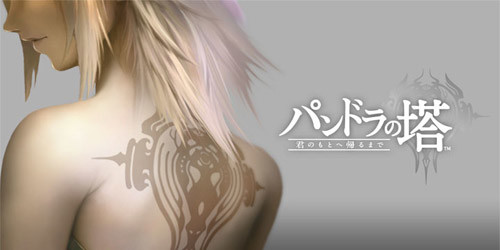
Operation Rainfall may fall on deaf ears in the U.S., but the cause isn't lost worldwide. Nintendo's European branch will release Xenoblade Chronicles this September, complete with British voice-overs and special-edition packaging. The Last Story will apparently follow there next year, and several sites report that Nintendo of Europe will also bring out Pandora's Tower in 2012. So there'll be English versions, and most of the Americans who want them will import them. And Nintendo of America will miss a few sales that didn't matter that much to the company anyway. And video games will move on.
NEWS
YASUMI MATSUNO JOINS LEVEL-5, NO LONGER VAGRANT
For a time, it seemed like Yasumi Matsuno would never settle down. After leaving Square Enix midway through Final Fantasy XII's development, Matsuno led the life of a freelancer, scripting Platinum Games' MadWorld and overseeing Square's Tactics Ogre remake for the PSP. Now Matsuno has a new home at Level-5.
It's an excellent match in several ways. Matsuno is known for complicated, relatively mature games with medieval-fantasy bents: Vagrant Story, Final Fantasy Tactics, and the numerous games of the Tactics Ogre and Ogre Battle series. Level-5's had quite a bit of success with their Professor Layton puzzle-adventures, and they're always trying to start franchises with RPGs like Dark Cloud, White Knight Chronicles, Rogue Galaxy, and their recent collaboration with Studio Ghibli, Ni no Kuni. The problem is that Level-5's RPGs lack strong storylines and memorable cohesion. They need a sense of dramatic force and guidance, and that's what Matsuno brings to his best games.
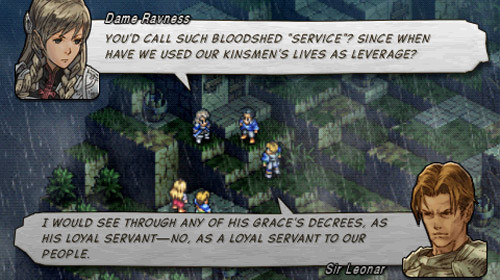
Matsuno's first project with Level-5 probably won't be a grandiose tale of troubling moral decisions like Tactics Ogre. Inspired by Level-5's success with Layton and Inazuna Eleven, Matsuno stated that he wants to make something accessible to both his fans and younger players, and he apparently hopes to make it in short order. During an interview with Famitsu, Matsuno and Level-5 founder Akihiro Hino showed off illustrations of fantasy-RPG character classes, suggesting a game not too far from the style of Ogre Battle. Most importantly, Matsuno said that this new game revived his enthusiasm for the art, and that may be what's most important.
AKSYS ANNOUNCES FATE/EXTRA FOR PSP AGAINST ALL ODDS
The PSP market may be flagging in the U.S., but Aksys isn't giving up on it. Far from it, the publisher's gunning for devoted anime fans with two upcoming PSP games. At the recent Anime Expo, Aksys announced North American releases for Fate/Extra and Hakuoki: Demon of the Fleeting Blossom. And both of them are surprising choices.
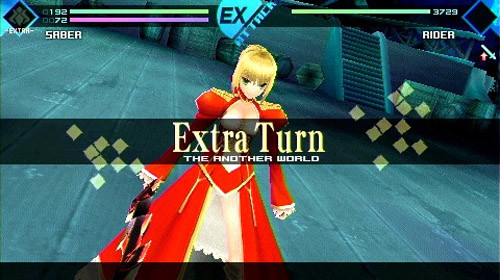
For one thing, Fate/Extra is an RPG in the Fate/Stay Night universe, which isn't getting much exposure over here any longer. For another, it's developed by Imageepoch, which was supposedly working with NIS America to localize games not so long ago. Those curiosities aside, Fate/Extra is heavy on conversations, and it's written by the original Fate author, Kinoko Nasu. Outside of all that talking, Fate/Extra presents battles between summoned Servants as a dungeon-crawling RPG, and those Servants are new versions of Archer, Saber, Caster, and others.
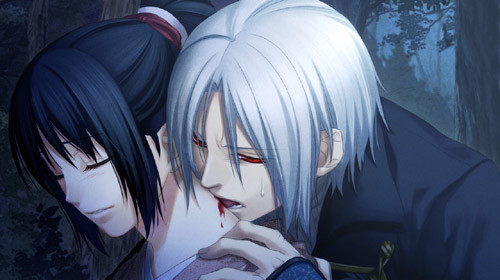
If Fate/Extra is a surprise, Hakuoki: Demon of the Fleeting Blossom is even further from the mainstream. That's because Aksys pitches it as an “otome” visual novel and dating simulator aimed at young women. Set in the waning years of Japan's Edo period, Hakuoki follows a girl named Chizuru as she races to find her father with the possibly unwanted help of the government's secret police. It's driven by dialogue and Chizuru's own decisions, most of which lead to her one attractive male character or another. Idea Factory crafted the original Hakuoki for the PlayStation 2 back in 2008, and it's since grown into anime spin-offs.
Fate/Extra is due out by the end of the year, with Hakuoki coming in 2012. Both will be released on the PlayStation Network and as retail copies, with the Japanese voice work intact.
CARPE FULGUR GRABS FORTUNE SUMMONERS
Carpe Fulgur, the startup localizers behind last year's charming mercantile RPG Recettear, are busy people. They're already at work on Chantelise, an action-RPG by Recettear developer EasyGameStation, and the recent Anime Expo saw them announce a third game: Fortune Summoners.
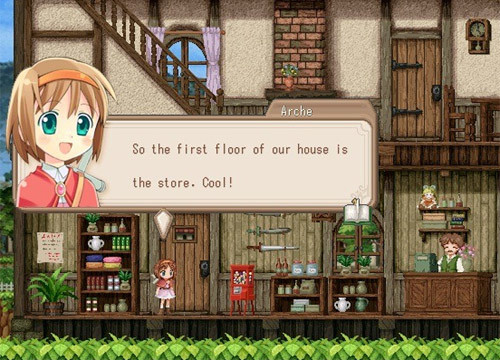
The creation of indie studio LizSoft, Fortune Summoners: Secrets of the Elemental Stone is a 2008 action-RPG with the look of a classic side-scroller. It follows three ain't-we-cute girl adventurers as they explore horizontal dungeons, hacking through enemies and solving puzzles with their powers: Arche is a doughty swordswoman, Stella is a fire mage, and Sana uses water magic. We expect some bickering between Stella and Sana as the trio makes their way through a medieval-fantasy world. The three-character party and action-platformer elements bring to mind Sorcerian and other old-school RPGs, though the game's dressed up with all sorts of flashing effects in combat.
Carpe Fulgur was reportedly in negotiations over Fortune Summoners earlier this year, and they've now worked out a release free of DRM. That release is the original Fortune Summoners, but it has the more polished visuals from the Deluxe version of the game brought out in 2009. It won't have Deluxe's voice acting due to licensing fees, but the basic Fortune Hunters still has plenty of vocal work. Carpe Fulgur hopes to have a demo out in the fall, and the final game's scheduled for the end of the year.
IN BRIEF: VANGUARD PRINCESS ANNOUNCED FOR U.S., RAPID ANGEL HITS PSN TODAY, CATHERINE DEMO NEXT WEEK
The indie fighting game Vanguard Princess turned some heads back in 2009 with its sidekick-character feature and bright graphics, courtesy of artist Tomoaki Sugeno. It didn't catch on in the mainstream, possibly because the game's even further down the “moe” rabbit hole than Arcana Heart. That isn't stopping EigoManga. At Anime Expo, the publisher announced that an English version of Vanguard Princess will be available on Xbox Live and PC. It'll apparently cost money, even though the original release of the game was given away for free. No release date was available at this writing.
MonkeyPaw Games keeps on releasing obscure PlayStation One imports on the PlayStation Network, and today welcomes the cooking simulator (or rather, grilling simulator) Yakiniku Bugyou and the side-scroller The Rapid Angel. Yakiniku tasks players with placing and browning meat and garnishes to perfection while customers look on in gluttonous impatience. For those who want something more traditional, The Rapid Angel is an action-platformer where three playable female characters brawl and jump through branching levels. It looks primitive, and the developer, Techno Soleil, also made the crappy shooter Gaia Seed. Then again, MonkeyPaw is selling it for $5.99, a fraction of what it runs in Japan.
Atlus has an interesting game with Catherine, a bluntly sexual tale of a nebbish thirty-ish man deciding between two women, framed by bizarre action-adventure dream sequences. And the Catherine demo, available in Japan a while back, will be out in English this July 12 on both the PlayStation Network and Xbox Live.
INTERVIEW: WIZARDRY'S ROBERT WOODHEAD
Anime fans know Robert J. Woodhead primarily as the co-founder of pioneering publisher AnimEigo. Yet he's done much more than bring Otaku no Video, Urusei Yatsura, Bubblegum Crisis, AD Police Files, Yawara! and other anime to North America. Long before he ever took the anime-publishing plunge, Woodhead and Andrew C. Greenberg created the 1981 computer RPG Wizardry: Proving Grounds of the Mad Overlord. It was the seed of a still-running franchise and the inspiration for countless RPGs in the West and Japan. Indeed, Wizardry remains consistently popular among Japanese players, with the nation's Wizardry spin-offs outnumbering the primary games in the series.
Nowadays, Woodhead runs AnimEigo with his wife, Natsumi Ueki, and builds robots with his sons. While he left the Wizardry series after the fourth installment, he still employs his reversed namesake from the games, Trebor the Mad Overlord, here and there. With a new Wizardry game, Labyrinth of Lost Souls, arriving on the PlayStation Network courtesy of Acquire and XSEED Games, we asked Woodhead to share some details about Wizardry history.
What was it like developing the original Wizardry? What was the point where you knew it was going to take off?
Basically, a lot of fun and a lot of hard work. I'd been kicked out of Cornell for a year…low grades due to too much playing with computers…and was able to devote myself to it. I guess our first inkling that we had something was at the original Boston Applefest, where we sold a pre-release version, “The Dungeons of Despair,” but we had no idea of the scale until it actually went on sale a few months later.
In the six years between Wizardry I and Wizardry IV, what was the biggest change in the way the games were made?
By the time we did Wiz IV, we had p-code interpreters for a bunch of machines. Wiz IV was actually written on a Japanese NEC PC-9801 running MSDOS; you'd type a command, and suddenly you'd see "Welcome to Apple Pascal". We actually bought a copy of Apple Pascal to run on the machine.
What influence, if any, did anime have on the early Wizardry games? Were you an anime fan when you and Mr. Greenberg made the original game?
None. The guy who was into anime was Roe Adams, the co-author of Wizardry IV.
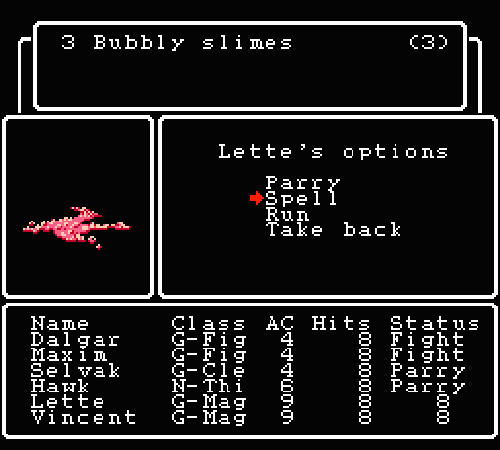
Did Wizardry's success in Japan influence you at all when you worked on Wizardry II through IV?
Well, I went over to Japan for several months during the localization process, writing p-code interpreters and externalizing all the text. Eventually, you could change all the text by changing a data file.
How difficult was it when you first localized the Wizardry games while in Japan? Were there many language issues or software compatibility problems?
It was a lot of work, but not difficult. Since Wizardry was written in Apple Pascal [UCSD Pascal], all that had to be done to move it to a new machine was…
Write a p-code runtime interpreter for the new machine—not that hard, especially if you already had one for the same processor family.
Write some assembly-language code to do the graphics—not that much, actually.
Localize the language datafiles.
Writing the localization system itself, changing Wizardry to use the datafiles, plus the writing the editors and other support software, and handling multibyte character sets… took a month or so. But that only had to be done once to support localization on all the machines for all of the games.
At one point I updated the graphic style of the game to use multiple overlapping windows, ala the Lisa and later the Mac. From the concept of the cute hack that let me keep track of the windows and display them properly through the implementation of the assembly code that did it, plus the changes to Wizardry to hook into that assembly code took only three days—though it was a single 72-hour coding marathon. I was young then.
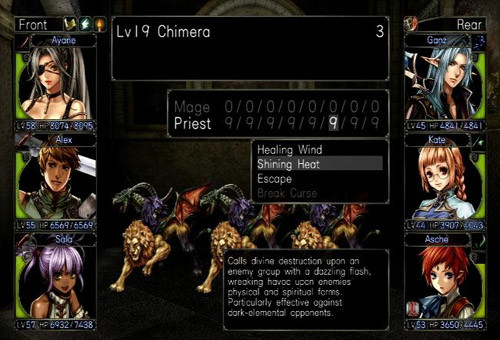
On that note, did Wizardry's success in Japan play any role in the founding of AnimEigo? Did it help AnimEigo when it came to licensing and working with anime studios?
My contacts in Japan due to the computer games helped. Toshio Okada, one of the founders of Gainax, invited me over to be a guest at a computer games event and arranged some meetings for me. He also provided an interpreter—who has been my wife now for almost 20 years.
What did you think of the Wizardry anime OVA from 1991? Were you surprised that they made one?
Yes, but it's a bit weird.
You mentioned on Colony Drop that you wanted to license the Wizardry anime but ultimately didn't, and that someone would have to get you drunk to pry the details of the story from you. Since you also mentioned that you don't drink, I don't suppose you'd give us a sober hint, would you?
It's so long ago that the details are fuzzy. It would have been a cool idea, but it was unclear if we could get the rights, given the fact that I was no longer connected with Sir-tech. Basically, more trouble than it was worth.
What do you think of the evolution of RPGs over the years, both for Japanese RPGs and Western RPGs?
Wizardry is in a sequence of games that started back on the PLATO system in the early-mid '70s. We loved those games and wanted to see if we could do something similar on a tiny home computer. We added some twists of our own, and then people took what we did and added their own perspective to it.
Have you played the new Wizardry: Labyrinth of Lost Souls for the PlayStation Network yet?
Nope. I have a PS3, but if I got the game and started playing it, my children would mock me—well, mock me more than they usually do.
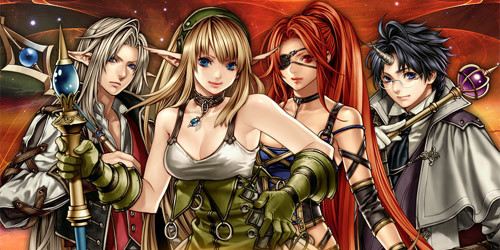
What do you think of the art for the characters and monsters in Labyrinth of Lost Souls?
Looking at the homepage, all I can say is that I didn't know Harry Potter was a unicorn.
Lastly, a question that has nothing to do with Wizardry and everything to do with Urusei Yatsura. What's your favorite episode of the series?
There are so many, they blur, but the one at the sento where the guys are trying to peek into the other side and see the girls naked comes to mind [Episode 101: Top Secret Pool Party Peeping Plan!]. The "Teenage Mutant Ninja Censors" that appear at the end are hilarious.
NEXT WEEK'S RELEASE
WICKED MONSTER BLAST What's that? You're depressed that not one of those interesting Wii games from Japan is coming to North America? Well, here's Wicked Monster Blast, all for you! What? Of course it's Japanese, you snotty little ingrate! It's got that goofy anime style! Look at that cat-thing! It's anime as all hell. Regardless of where it was made, Wicked Monster Blast stands above the typical family-game dross, as it's a cute party shooter that recalls Namco's Point Blank games. A bunch of animals, including a militant eagle and a robot-piloting goldfish, all blast things in various mini-games and gesticulate adorably. Four players can compete at once, and the diversions include shooting bottles from a unicorn bartender's hands, popping mid-air missiles, and shredding cartoon buildings until they collapse. Also, there's nothing else coming next week beyond reissues of Mafia II and The Elder Scrolls IV: Oblivion. |
discuss this in the forum (27 posts) |
 Developer: Interworks
Developer: Interworks